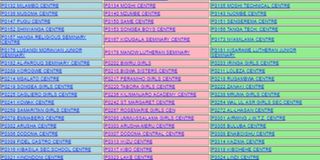Why Arusha school got poor Form IV results

What you need to know:
Poor performance of students, especially girls, doing science in the national examinations has also been attributed to lack of laboratory equipment and other training kits
Arusha. One of the public secondary schools with a high student intake is short of science teachers, it was announced here yesterday.
Ngarenaro Secondary School currently has 49 teachers, but needs at least 12 to teach science and commerce subjects.
The performance of the school, which currently has nearly 2,000 students, has fallen due to the shortage of teachers, according to councillor Isaya Doita.
He told The Citizen that he was reaching out the Education department in Arusha City to bring the required teachers before the situation worsens.
According to him, the school also has an acute shortage of latrines.
On security, Mr Doita said he was mobilising resources from corporate bodies and other well wishers to construct a perimeter wall around the school.
The school is located in the high density Ngarenaro suburb near Dodoma Road. It is close to the famous Kilombero wholesale food market.
The opposition party councillor lauded the government for its ‘free education’ policy, but urged the authorities to address the shortage of teachers,desks,latrines, classrooms and water.
In recent years, the government has spearheaded a drive to encourage schoolgirls to embrace science subjects.
Arusha regional authorities, however, have attributed the poor learning of science in both primary and secondary schools to the limited number of science teachers.
It is currently estimated that the region has the shortage of nearly 1,000 teachers in the public secondary schools alone.
The science subjects in question are biology, physics, mathematics and chemistry. Physics is the most critically affected subject, according to education experts.




